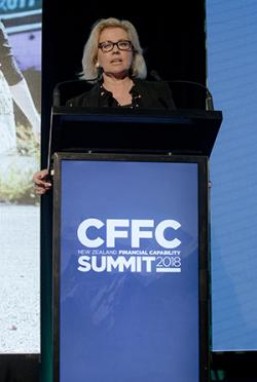Changes to improve KiwiSaver for all New Zealanders were among the many ideas to come out of the biennial Financial Capability Summit hosted by the CFFC.
Held at the Cordis Hotel in Auckland from June 11-12, the Summit brought together more than 300 people working in the field of financial capability from across New Zealand. They represented government agencies, NGOs, community organisations, academia, research companies, banks and financial institutions.
The Minister of Commerce and Consumer Affairs, Kris Faafoi (pictured above), opened the main Summit day on June 12, acknowledging the work of the CFFC and its efforts to work collaboratively with other government and private sector organisations.
"The government commits to do what we can to assist your efforts in raising New Zealanders' financial capability and preparing people for retirement," said Minister Faafoi. "At the heart of what we do is enabling people to live the best lives they can, for themselves and their families."
|
Day 1 of the Summit saw four workshops tackle the topics of researching the area of financial capability (FC), raising FC among Māori and Pacific communities, the role of technology in building FC, and building financial resilience with emergency savings. The main Summit day on Day 2 featured a series of presentations and panel discussions, preceded by a session hosted by broadcast journalist Susan Wood in which she interviewed two young people and two older people about their attitudes to money, and expectations/experience of retirement. Among the subjects canvassed throughout the day were the ownership of data and associated privacy issues, the impact of high-cost consumer debt on vulnerable groups, an overview of the CFFC's development of the Sorted in Schools programme, and an interview by Susan Wood of Tim Fowler of the Tertiary Education Commission about the need for lifelong learning to enable people to stay in the workforce past 65. |
 |
The CFFC's Fraud Education Manager Bronwyn Groot presented an overview of the rise of fraud in number and sophistication, and the CFFC's role in helping fight back against international fraud organisations.
The CFFC's Education Manager, David Boyle, unveiled his idea for an emergency savings account connected to KiwiSaver, to prevent people taking out expensive loans or withdrawing all their KiwiSaver savings under the hardship exemption if they run into financial difficulty. It would also give those concerned about not being able to afford being in KiwiSaver a buffer, should they need cash.
Boyle believes such a fund could be key in preventing vulnerable people from spiralling into debt, and boosting retirement savings over the long term.
A panel discussion on 'KiwiSaver 2.0' saw each member asked for their top three ideas of how to improve the scheme. Ideas included introducing a "small steps" programme whereby people on low incomes could start contributing 1% of their wages, increasing gradually to 3%; providers of default funds making age-appropriate decisions about which kind of fund a saver was assigned to, and requiring all employers to pay the 3% employer's contribution on top of wages, not bundled into salary packages.
The head of the CFFC, Retirement Commissioner Diane Maxwell (right), said the Summit was hugely successful in bringing people together to focus on the long term financial wellbeing of New Zealanders, and the country's economy.
"We currently spend $30 million a day on Superannuation; that will rise to $98 million a day in 20 years if we do nothing," said Maxwell. "Improving individuals' financial capability is key in helping them reach their life goals and arrive at retirement in good financial shape, putting less pressure on the public purse in the long term."
There was high media interest in the Summit; a selection of links is below:
